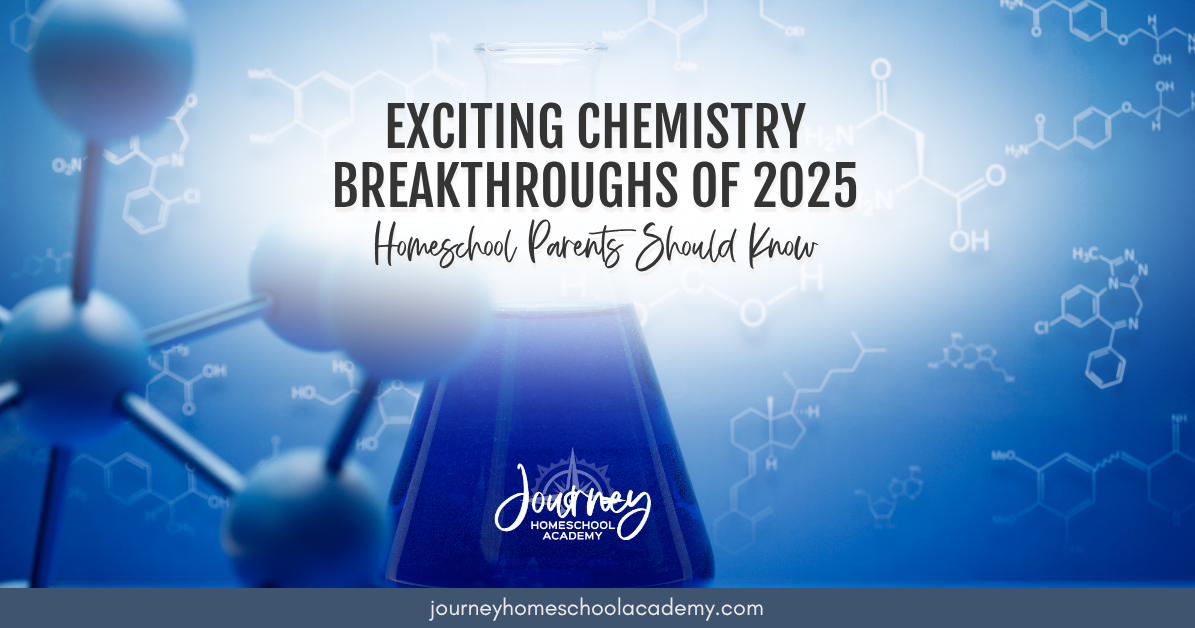If the word chemistry still brings back memories of high school beakers bubbling over and formulas that made no sense, you’re not alone…
As a homeschool parent, I’ve had my fair share of nervous moments staring at the high school science lineup, thinking, “Am I really qualified to teach this?” But here’s the good news: today’s chemistry isn’t just about memorizing the periodic table or balancing equations. It’s alive, it’s awe-inspiring, and it’s uncovering mysteries about God’s world that even professional scientists can hardly believe.
And while we’re only in October 2025, this year has already been full of remarkable discoveries, with more likely to come. That makes it the perfect time for homeschool families to get curious and start exploring what’s happening in the world of modern chemistry.
Let’s take a look at some of 2025’s most exciting chemistry breakthroughs and how they can spark wonder in your homeschool classroom.
Exciting Chemistry Breakthroughs of 2025 Homeschool Parents Should Know
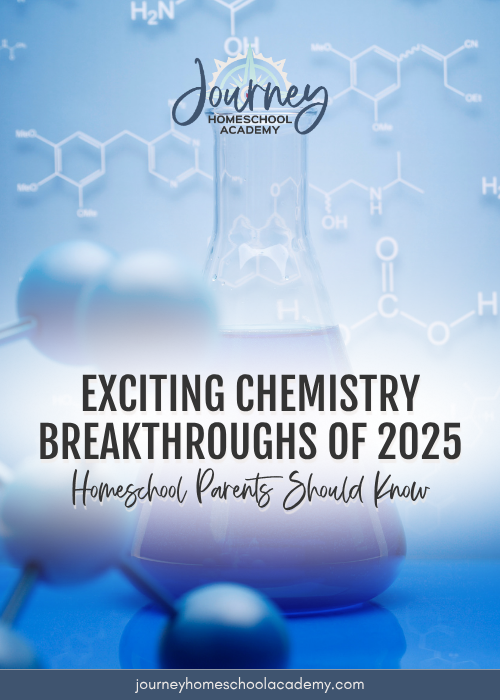
Why Keeping Up with Modern Chemistry Matters for Homeschool Families
Homeschool parents are often caught between two pressures: wanting to give our kids a solid academic foundation, but also wanting to make learning meaningful.
Chemistry can feel intimidating, but keeping up with current discoveries actually makes the subject easier and far more exciting to teach. When our students see that real scientists are still asking questions and making new discoveries, it helps them understand that learning isn’t about memorizing, it’s about exploring.
Plus, it gives us homeschool parents some great conversation starters over breakfast. (“Did you know they just created a plastic that decomposes in weeks instead of decades?” Definitely beats talking about the weather.)
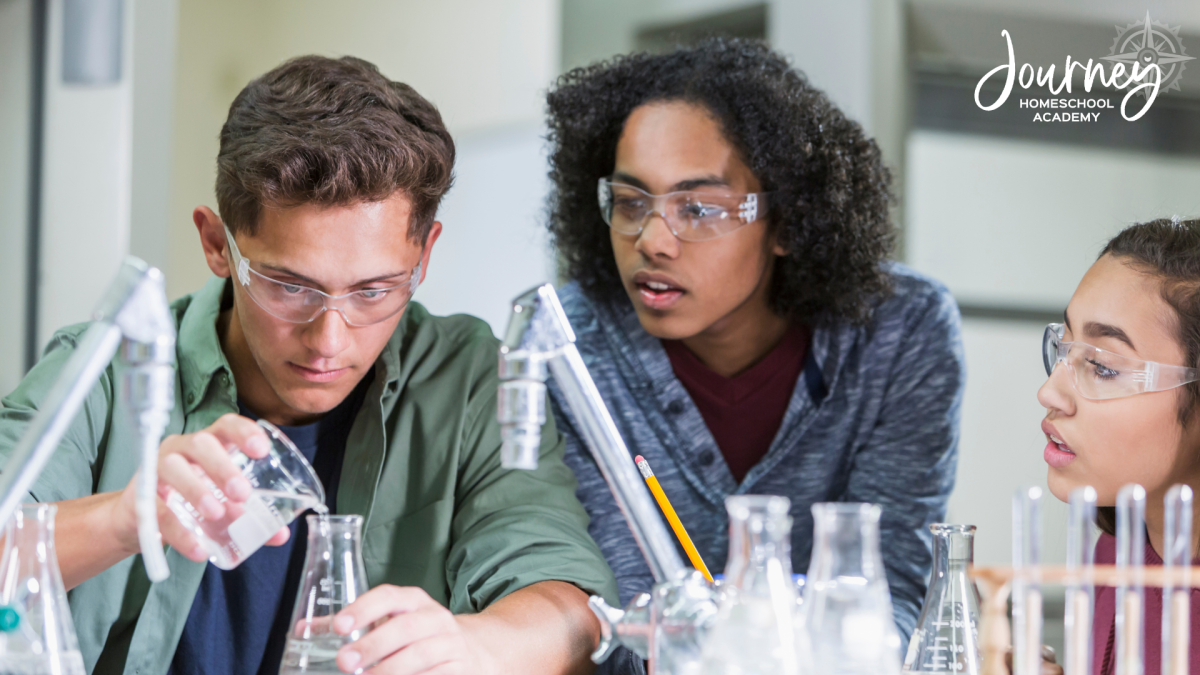
2025’s Most Exciting Chemistry Breakthroughs for Curious Students
Science is moving fast, and 2025 has been a particularly thrilling year for chemistry lovers. Here are a few discoveries that have already made headlines, along with some ways you can connect them to your homeschool lessons:
1. Artificial Photosynthesis Finally Works, Like Really Works
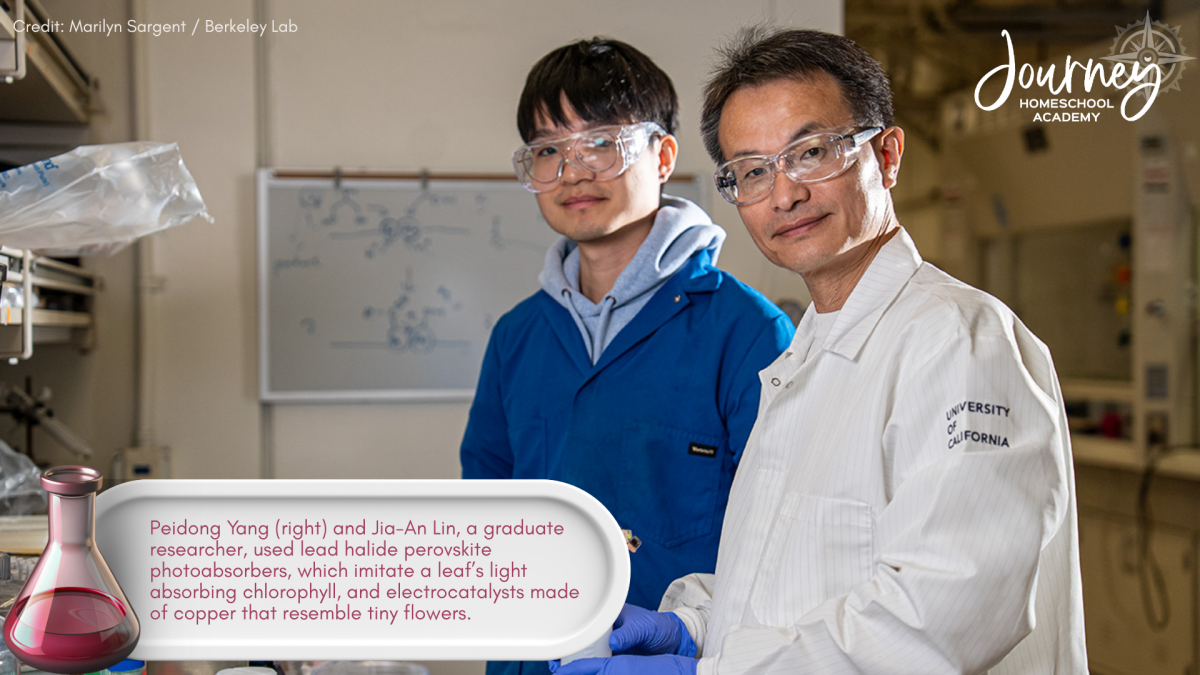
For decades, scientists have been trying to imitate what plants do naturally: turning sunlight, water, and carbon dioxide into fuel. But this year, researchers finally made a breakthrough in artificial photosynthesis that could change the way we think about renewable energy.
In simple terms, they’ve developed synthetic “leaves” that can generate clean fuel more efficiently than ever before.
For homeschoolers, this is a golden opportunity for hands-on learning. Head outside, grab a real leaf, and talk about how plants “make” their own food through light. Then ask, “How might scientists use God’s design to create new energy sources?”
2. Plastics That Disappear Without a Trace
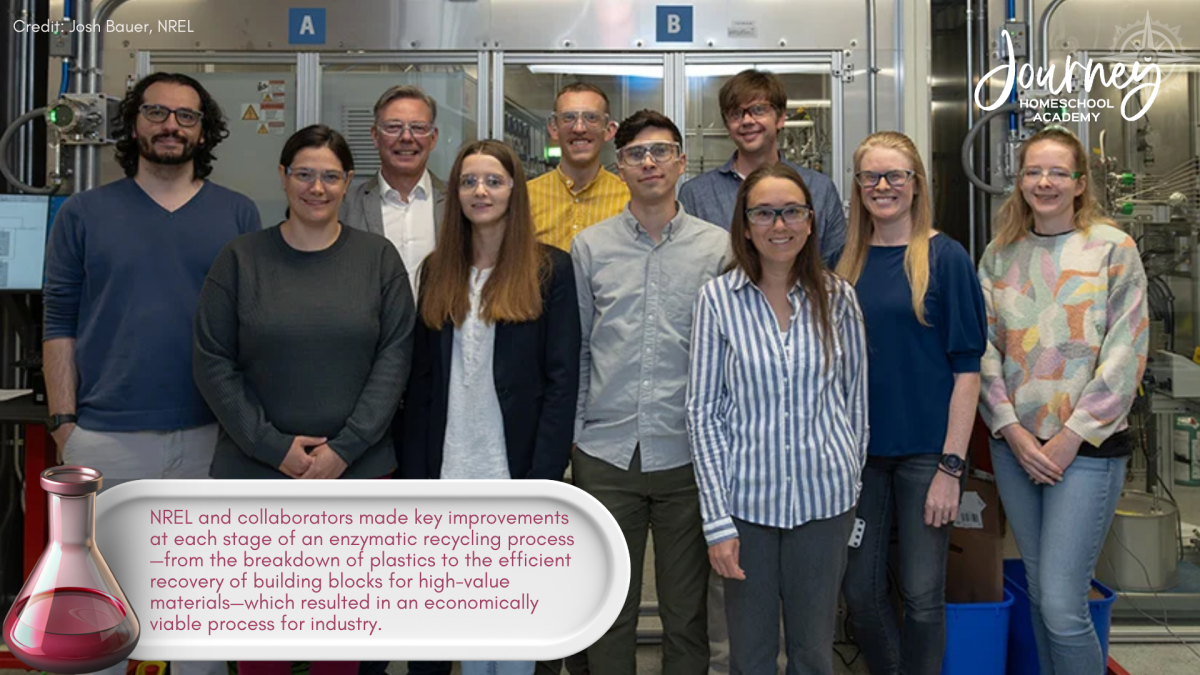
This might be my favorite, mostly because I’ve seen firsthand how quickly kids go through plastic!
In 2025, chemists announced a new kind of enzyme-based plastic that can break down completely in less than three weeks. No toxic leftovers, no microplastics, just natural, safe compounds that return to the earth.
For families trying to live more sustainably, this is a great way to introduce the concept of stewardship. Have your kids set up a simple home experiment comparing how long different materials, like banana peels, paper, and plastic, take to decompose.
When science connects with caring for creation, it gives students a tangible way to see how chemistry impacts the world they live in.
3. Quantum Chemistry Gets Practical
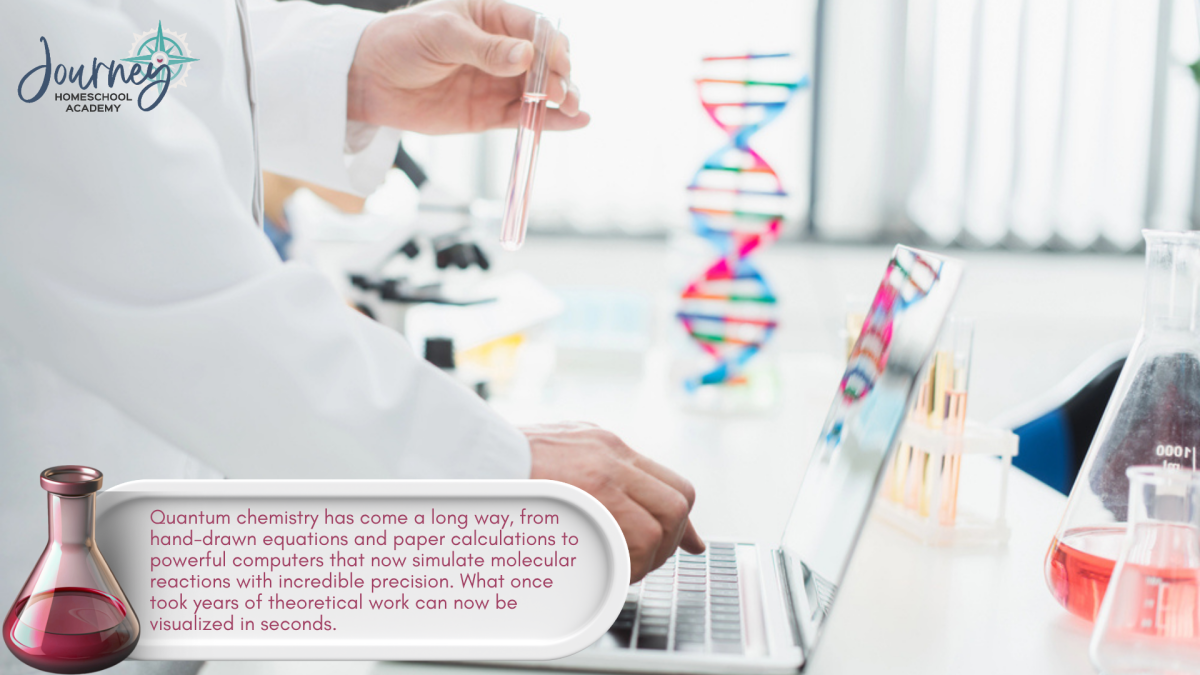
Okay, “quantum chemistry” sounds like something out of a sci-fi movie, but hear me out. This one’s truly fascinating.
For years, quantum chemistry has been more theory than practice. Scientists used equations, models, and a lot of imagination to understand how atoms behave at the tiniest scales. But now, as quantum computing continues to evolve, researchers are actually using this cutting-edge technology to simulate and predict chemical reactions that were once impossible to calculate by hand.
In simple terms, computers are finally starting to think like molecules do, helping scientists design cleaner fuels, safer materials, and more effective medicines.
For homeschoolers, this opens up a fun opportunity to show how math and science work together in the real world. Quantum chemistry depends on logic, problem-solving, and creativity, the very same skills our kids use when coding, playing strategy games, or solving puzzles.
4. Self-Healing Materials: Chemistry That Fixes Itself
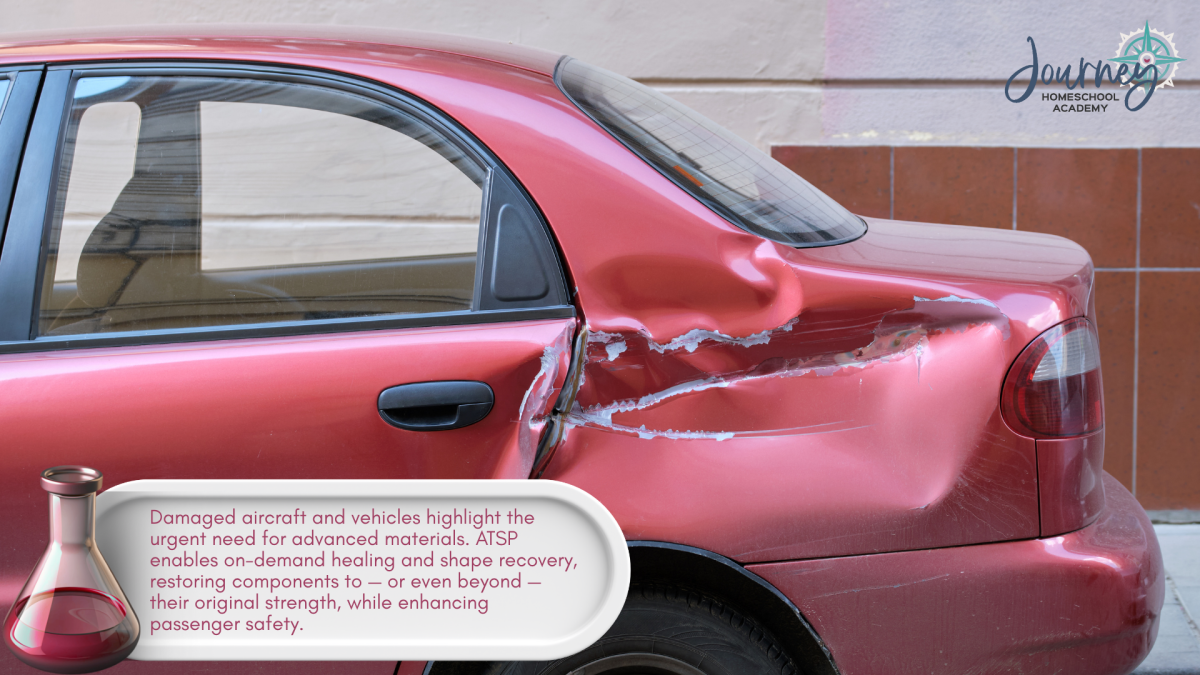
Imagine if your phone screen or favorite mug could repair itself after a crack. Sounds crazy, right? Not anymore.
This year, researchers developed self-healing polymers that literally “heal” when damaged by reforming their chemical bonds over time.
This discovery gives us a fascinating peek at how chemistry overlaps with engineering and technology. And it’s a great conversation starter about how God designed molecules to interact with order and precision.
For a fun experiment at home, have your kids explore simple polymer reactions, like making slime or oobleck, to see how molecular bonds behave.
Making Modern Discoveries Come Alive in Your Homeschool
You don’t need a chemistry degree to make these ideas come to life. You just need a bit of curiosity and maybe a good apron for when experiments get messy.
Here are a few practical ideas for bringing modern discoveries into your homeschool this year:
- Watch together: Explore short science news clips or YouTube videos about new discoveries.
- Ask “What if?” questions: Encourage kids to imagine how new technologies could help people.
- Experiment simply: Use household items to demonstrate big ideas, from photosynthesis to polymer reactions.
If you’re ready to take your homeschool chemistry beyond the textbook, there’s a course that does exactly that, and it’s designed specifically for Christian homeschool families.
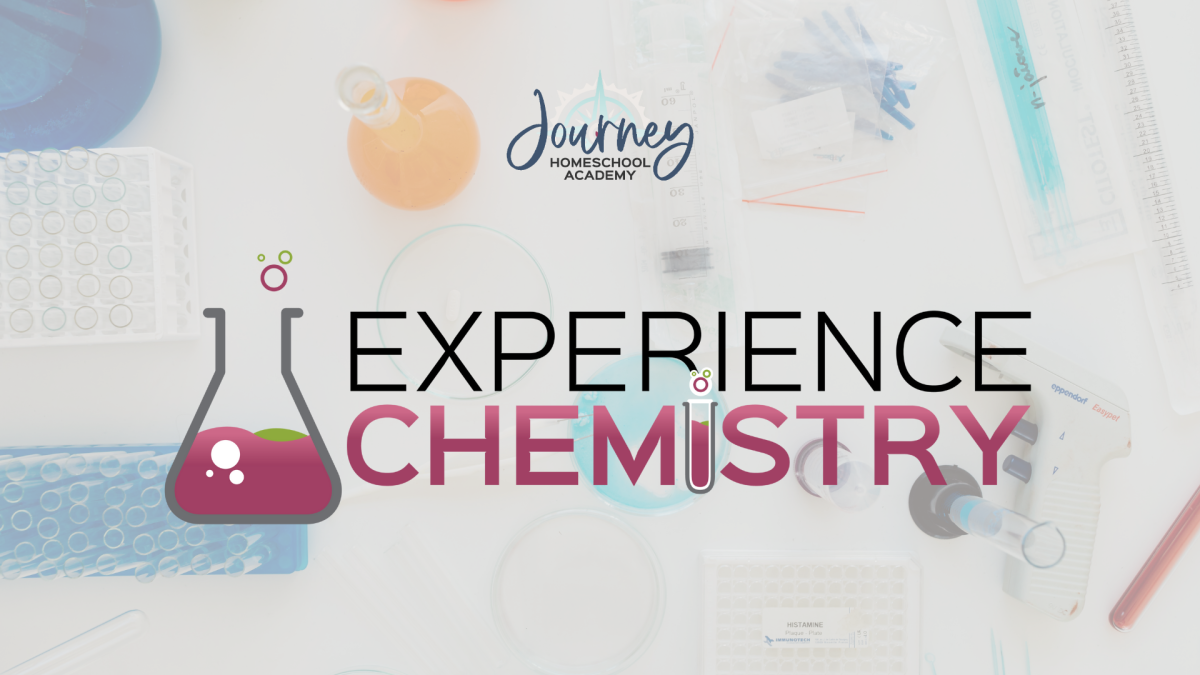
👉 Check out Experience Chemistry, a video-based, lab-rich course from Journey Homeschool Academy that brings the wonders of chemistry to life in a way that’s both academically solid and deeply engaging.
Your student doesn’t just learn about chemistry, they experience it.
How Experience Chemistry Turns Textbook Knowledge into Discovery
What makes Experience Chemistry such a hit among homeschool parents and teens is that it transforms abstract science into real-world understanding.
- 🎥 Video lessons are led by passionate instructors who love what they teach, and it shows.
- 🧪 Hands-on labs bring every concept to life using accessible materials.
- 📖 Clear structure and accountability let high schoolers work independently while parents track progress with ease.
- 💡 Built-in support: Quizzes are graded, lab guides are detailed, and parents have everything they need to stay confident without being the “expert.”
One mom put it perfectly:
I love that I don’t have to remember anything from my high school chemistry class 30 years ago! My daughters are learning far more than I could have ever taught them if I’d tried to teach it on my own. I was fine for teaching my daughters elementary and middle school science, but I can’t even imagine trying to teach Chemistry on this level.
— Bev, mom of Experience Chemistry students
